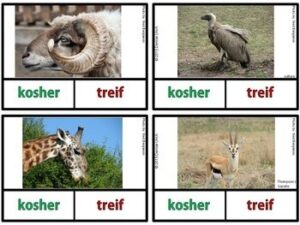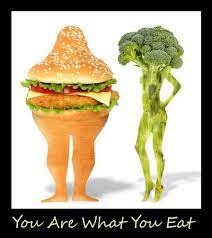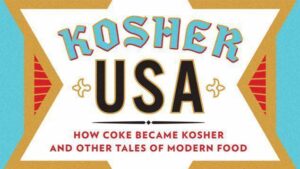Raboyseyee and Ladies,
A big mazel tov to first time grandparents, Astrid and Mordy Leifer upon the birth -before Pesach and bris -also just before Pesach- of a grandson born to their children Avigail and Gabriel Leifer. A special mazel tov shout out to great grandmother Sara Leifer and to Astrid’s parents, great grandparents, Mr. and Mrs. Joseph and Lieve Guttmann. Mazel tov as well to Avigail’s parents, Raizy and Shlomo Hackel and to both very excited extended families. Welcome to the world Noah Herman Leifer (נועם צבי) and may you be a source of pride and joy always.
Shoin. We survived the Yom Tov feeding frenzy and festival which featured food kimat 24/7, smoothies’ poolside, bbq’s at the beach, and much more. We are too fat to come home. Accordingly, we have moved onto Miami beach for the next five days hoping to exercise and walk enough so that our clothing will fit. Hec, some 3300 years back, it took the Yiddin 40 years to walk off their one Pesach meal. What’s in store for us after eight days and at least three meals daily? Did I mention tea room? And daily bbq’s between the meals? Oy vey! The bottom line: The pants must close before we board the return flight.

Shoin, Pesach is over and so are any resolutions you made earlier this year about losing -or, at least maintaining- weight. In the battle of the shmorg vs humankind, animalistic instincts always prevail; the shmorg never loses. We are but chazerim and fartig! It’s time to start anew after binging like animals these past 8-12 days -depending on how generous your sponsor was with your vacation.
As fate would have it, this week’s parsha contains quite the discussion on food consumption, and we begin near the end of the parsha where the heylige Toirah (Vayikro11:1-4; 7-8) tells us azoy:
”Tell the people of Israel, ‘These are the living creatures which you may eat among all the land animals: any that has a separate hoof which is completely divided and chews the cud – these animals you may eat. But you are not to eat those that only chew the cud or only have a separate hoof…the pig is unclean for you, because, although it has a separate and completely divided hoof, it doesn’t chew the cud. You are not to eat meat from these or touch their carcasses; they are unclean for you.”
It does epes appear that the entire kosher gisheft (industry -which as an aside, adds billions to the economy each year and more on that below- started here in Shmini with but a few sentences about animals, fish, birds and even insects. But is that true? Not exactly because way back in Sefer Shmois (34:26), we learned “you shall not boil a kid in its mother’s milk.” Milk and meat need to be separated. Ober, that was but the first layer of kosher. The real meat of kosher laws, the meat of animals, fish and birds, is found right here in our parsha. The bottom line? Not all meat is kosher for consumption, if you chap and some cannot even be touched, also if you chap.
Ober we ask the following questions: Does the RBSO have a penchant for cows, goats, and pigeons? And does He have mamish detest pigs, mice, and weasels? So it would appear. And if He does hate certain unclean animals, bottom feeders, and other insects, why did He create them? Was he just testing us? Did He davka put lobster, bacon, and other zachin out there in front of our faces to see if we could overcome our temptations? Didn’t he know that Yiddin are quite weak when it comes to forbidden meat?
Does the RBSO have certain prejudicial feelings towards certain animals, birds, fish and insects? If not, why would certain be kosher for consumption and others proscribed? What’s taka pshat? What makes the cow and other animals in the kosher category so damn attractive? How are we to chap these laws? Did the RBSO tell us why He wanted us to eat kosher? Did He tell us why certain fish and other insects were not kosher? Not! Instead, He just barked out the instructions and left it up to the good rabbis, sages and others to put on the spin. And why would the RBSO care what we ate for breakfast, lunch, or dinner? Would it be so girferlich if we ate some bacon in the morning, a cheeseburger or non-kosher pizza for lunch? Maybe even a shtikel ham?
Did the RBSO while distinguishing between permitted and forbidden animals, give us explicit explanations for the rules? Not! Rather, our parsha offers only opaque criteria for determining “pure” and “impure” creatures. It’s all a shtikel mysterious and this sense of mystery is itself compounded by the fact that different distinctions are made among different sorts of species. Limoshol, (by way of example only), when it comes to quadrupeds, we are informed that only an animal “with clefts through the hoofs, and that chews the cud—such you may eat.” From this rule, we learn that Yiddin are permitted to partake of domesticated animals (beheimis) such as the cow, goat, or lamb, as well as of “wilder” species (chais) such as the deer and the antelope, but are enjoined not to eat of the pig, camel, hare, or rock badger, which lack one of the two required signs, or of the horse, bear, or rhinoceros, which lack both. In the case of fish, the heylige Toirah permits only those with both fins and scales. Species of marine life lacking one of the two, such as the shark or catfish (which have no scales), or both, such as shellfish, are forbidden. In yet another mystery, during the laws of birds, the heylige Toirah gives zero guidance for the determinations of permitted fowl at all, but instead merely lists those that are forbidden. “The following, “you shall abominate among the birds,” going on to list the eagle, the falcon, the vulture, and the owl, among others. Why were they forbidden? Ver veyst? The RBSO didn’t explain and doesn’t owe us any explanation. Ober, did that stop the heylige Gemora from having discussions and concluding that all the forbidden birds are predators? Not! Does the heylige Toirah so state? Not explicitly. The bottom line: readers of the heylige Toirah are presented with a compendium of rules for kosher without any immediate explanation for them.
 What’s pshat? Perhaps, we’re not necessarily supposed to chap them. It appears that the laws governing what’s kosher and not fall into the category of chukim (do them because I -meaning the RBSO) said so; no questions asked. Ober what are they? On a more serious note, let us examine the chok. Chukim – as you should well know from your many years in yeshiva and elsewhere- are mitzvis whose reasons were not directly revealed. Says the heylige Gemora (Yoma 67b), azoy: “‘Ani Hashem chakaktiv, ein l’cha r’shus l’harheir bahen” – “I have decreed a decree, you have no permission to doubt it.” The literal translation of “l’harheir bahen” is “to think about them.” At first glance, this would imply that attempting to give reasons for the chukim is inappropriate. Is that so? Don’t many exegetes -to include Rishonim (early sages) attempt to give reasons for the chukim? They do. They even attempt to tackle the paradigmatic chok, that of the Para ‘Aduma, the Red Heifer. What’s pshat?
What’s pshat? Perhaps, we’re not necessarily supposed to chap them. It appears that the laws governing what’s kosher and not fall into the category of chukim (do them because I -meaning the RBSO) said so; no questions asked. Ober what are they? On a more serious note, let us examine the chok. Chukim – as you should well know from your many years in yeshiva and elsewhere- are mitzvis whose reasons were not directly revealed. Says the heylige Gemora (Yoma 67b), azoy: “‘Ani Hashem chakaktiv, ein l’cha r’shus l’harheir bahen” – “I have decreed a decree, you have no permission to doubt it.” The literal translation of “l’harheir bahen” is “to think about them.” At first glance, this would imply that attempting to give reasons for the chukim is inappropriate. Is that so? Don’t many exegetes -to include Rishonim (early sages) attempt to give reasons for the chukim? They do. They even attempt to tackle the paradigmatic chok, that of the Para ‘Aduma, the Red Heifer. What’s pshat?
Seemingly, our sages of yore understood the RBSO’s instructions to mean something different than their literal translation. They took the words “l’harheir bahen” as translated above. One is not permitted to doubt the authenticity of the commandment, but one can -and perhaps even should- seek out various messages which can be derived from the chukim. And so they did.
 The RambaM, RambaN and other Rishonim, based on various midroshim conclude that strict observance of the kosher laws allows one to come closer to the RBSO, instills religious belief, and leads to success in Toirah study. On the other hand, those who violate kosher, those who eat treif- might suffer from “timtum haleiv,” (a spiritual clouding of the mind). Specifically, beasts and birds of prey were prohibited because consumption of their meat would lead to an improper spiritual outlook. Says Rav S. R. Hirsch that eating non-kosher causes spiritual danger and adds that even animals like the hyrax and the mouse who are herbivores and not carnivores were prohibited since they are extremely active creatures symbolizing a general excessive pre-occupation with the purely physical side of the world. Contrasted with them are the kosher cow and sheep, docile farm animals who inform us, that although we must engage the world, we should not be totally pre-occupied with its physical side. Does all this make sense to you? Not? back to the bottom line: Chukim (חוקים) are inexplicable laws!
The RambaM, RambaN and other Rishonim, based on various midroshim conclude that strict observance of the kosher laws allows one to come closer to the RBSO, instills religious belief, and leads to success in Toirah study. On the other hand, those who violate kosher, those who eat treif- might suffer from “timtum haleiv,” (a spiritual clouding of the mind). Specifically, beasts and birds of prey were prohibited because consumption of their meat would lead to an improper spiritual outlook. Says Rav S. R. Hirsch that eating non-kosher causes spiritual danger and adds that even animals like the hyrax and the mouse who are herbivores and not carnivores were prohibited since they are extremely active creatures symbolizing a general excessive pre-occupation with the purely physical side of the world. Contrasted with them are the kosher cow and sheep, docile farm animals who inform us, that although we must engage the world, we should not be totally pre-occupied with its physical side. Does all this make sense to you? Not? back to the bottom line: Chukim (חוקים) are inexplicable laws!
And says Rashi (Vayikro 18:4) azoy:
ואת חקתי תשמרו – דברים שהם גזירת המלך, שיצר הרע משיב עליהם, למה לנו לשומרן, ואומות העולם משיבין עליהם, כגון אכילת חזיר ולבישת שעטנז וטהרת מי חטאת, לכך נאמר אני ה’ גזרתי עליכם, אי אתם רשאים להפטר:
“My laws you shall observe – matters which are a King’s decree. The evil inclination objects to them [saying], “why should we observe them?” So happens that Rashi mentions the prohibition against mixing wool and linen (שעטנז), the protocols for the red heifer, and the injunction against eating pigs but does not enumerate the many other creatures forbidden for consumption in our parsha such as camels, hares, eagles, owls, and weasels. The bottom line: chukim are laws, whose rationale cannot be discerned by the human intellect. Ober, still we ask azoy: why did the RBSO create classes among the animals? Why did He designate some as kosher and others as not? Ober raboyseyee, the RBSO is great and avada if He gave us very specific instructions on what to eat and avoid, there must be a good reason. So happens that He did not feel like sharing his rationale. Case closed? Is there real rationale behind these laws of kosher and not kosher? And why taka create non-kosher animals? Efsher we can kler azoy: various non-kosher animals have their roles to play in the ecosystem -as predators, scavengers, etc. Also, some are useful to us in capacities other than food: how would our ancestors have traveled from place to place without donkeys, horses, camels, etc? Says the heylige Gemora (Eruvin) that both the cat and the ant (non-kosher animals) exist in order for us to learn from their character traits. The bottom line: everything the RBSO created has a purpose.
Ober raboyseyee, efsher we can kler azoy: The kosher laws were given by the same RBSO who has placed other boundaries around our behavior in every other area of life and es-farshteyt-zich (stands to reason) that if we accept His authority – although we do act out from time to time- He has also the authority to place boundaries around our diets. Shoin and erleydigt (settled)! Moreover, if we acknowledge that He has the authority to regulate our sexual inclinations and appetites, though there too, we avada don’t always follow the rules, if you chap, we must also recognize that He has the authority to regulate our stomachs. Shoin and case closed.
 The bottom lines: Though many mitzvis in our special tradition encourage the exercise of human intelligence in the worthy attempt to chap the profundity of the RBSO’s laws, none of them make one’s observance of the laws conditional upon one’s understanding of them. The heylige Toirah lays out the framework for the original “you are what you eat” manifesto. Laws governing the eating and keeping kosher -ad hayoim hazeh- (until today), remain a shtikel mysterious. Keeping kosher defies logical reason. In other words: we are to keep kosher! Why, is none of your business! Mistama the RBSO had good reason and one day -hopefully not too soon- you can ask Him directly.
The bottom lines: Though many mitzvis in our special tradition encourage the exercise of human intelligence in the worthy attempt to chap the profundity of the RBSO’s laws, none of them make one’s observance of the laws conditional upon one’s understanding of them. The heylige Toirah lays out the framework for the original “you are what you eat” manifesto. Laws governing the eating and keeping kosher -ad hayoim hazeh- (until today), remain a shtikel mysterious. Keeping kosher defies logical reason. In other words: we are to keep kosher! Why, is none of your business! Mistama the RBSO had good reason and one day -hopefully not too soon- you can ask Him directly.
Ober after giving this topic more thought, the heylige Ois has concluded that the RBSO -as always- had a plan. And what was the plan? The plan was that by dictating kosher laws, not just would He create jobs and business opportunities that included manufacturing, distribution, slaughtering, kosher food expos, eateries, mashgichim (supervisors), chasiddishe truck drivers with big key chains, and many more to pick from, but the plan went deeper. The RBSO chapped that His Yiddin need to spend time together and away from the goyim who could possibly influence them towards avoido-zoro and other avayris. He didn’t want us eating out in restaurants where one can be seated near a hot shiksa model. Yiddin needed to meet and see each other regularly. So- for the men, He gave us shul where we are supposed to meet daily, say a few words out of the siddur, schmooz, bad mouth a few people, tell or listen to a few jokes, gossip, and on shabbis and other occasions, to also make a le’chaim, plan and to plot your own breakaway minyan. Shul is fun Ober what about the veyber, the women? Nu, for the women He created the kosher destination. Indeed because we all eat kosher, we tend to shop at the kosher supermarkets and there, while moving the veygila (shopping cart) up and down the aisles, the women, accompanied rarely by their men, get to schmooz with one another, gossip and catch up on all the local loshoin horo, fashion, and of course bad mouth a few people. And it’s taka emes: Yiddin meet each other at the local kosher bakery; they shop at the same grocery and patronize kosher butchers and restaurants. Seemingly, these laws are a major force in maintaining Jewish unity and act as a social barrier against assimilation by creating a feeling of community among the Yiddin. Gishmak.
Or, is pshat azoy? A long time ago, the RBSO was efsher (perhaps) thinking to Himself azoy: what’s the most difficult restriction I can put on My chosen people? How will they be distinguished from the rest of the nations? And……how can I combine this one restriction with perhaps the biggest of business opportunities, one that will forever despite the emergence of AI and no matter how much technology advances still be relevant? How can I put tens of thousands of Yiddin to work? What job will entice even the most pious the most religious charedim to seek employment? Even charedim? Yes! He is the RBSO and this week, mamish right here in Parshas Shmini which we will have the pleasure of hearing as we get back on track with the parsha of the week, the RBSO mamish delivers the big one. Eating and keeping kosher! Indeed, all the kosher laws on the official books can be found in not too many sentences. Of course, since the heylige Toirah was given over 3300 years ago, these laws have been greatly expanded so that others could also make a living and today, kosher is an industry that is -as mentioned above- worth billions in revenue yearly. That’s billions with a ‘b.’
It’s mistama the biggest of all the industries the RBSO created for the Yiddin to enjoy and make a living from. Even within kosher, there is regular kosher, glatt kosher, kosher but dairy, kosher and pareve, kosher but made with dairy equipment, kosher also for Pesach, and for those seeking to improvise, the KE, or kosher enough. These laws have given birth to myriad organizations that bilk -we mean earn- millions making sure that all is kosher. Mamish tens of thousands of Yiddin all over the world are involved -directly and not- in the kosher food business. It’s so big and lucrative that in recent years, even the goyim decided to enter this marketplace. In today’s times, it’s mamish challenging to eat non-kosher. Some, are up to the task, oy vey.

Another bottom line: one of the effects of the dietary laws, is mamish alluded to in this week’s parsha. Says the heylige Toirah (Vayikro 20:25-26): “You shall distinguish between the clean animal and the unclean and between the clean bird and the unclean… You shall be holy for Me, for I, G-d, am Holy; and I have separated you from the peoples to be Mine.” Says the Ohr-Hachaim azoy: These pisukim (verses) suggest that there is a link between observing the laws of kashrus and maintaining our identity as a distinct, unique people among the nations of the world. Gishmak and shabbis tish-worthy.
The final bottom line: keeping kosher and kosher in general, has contributed very significantly to our survival as a distinct nation. Yiddin all over the world have common dietary patterns. We are what we eat and we eat too much.

A gittin Shabbis-
The Heylige Oisvorfer Ruv
Yitz Grossman

1 Comment
As I sit at the Cancun airport holding my stomach after 4 days of food poisoning, the last thing on my mind is the tea room. I cannot think of cows kosher or not. I can’t think of anything that has to do with food. If I do, I will barf. I think the Christians got it right with Lent. Yes, we do have בהב for 3 days, but that doesn’t cut it. Have a great Shabbos. Hope פסח went better for you.